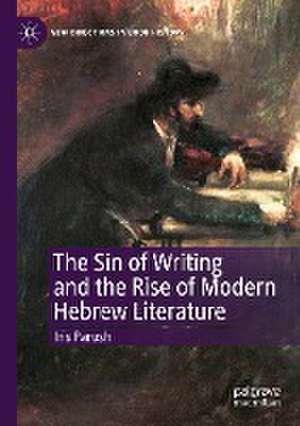The Sin of Writing and the Rise of Modern Hebrew Literature: New Directions in Book History
Autor Iris Parush Traducere de Jeffrey M. Green Contribuţii de Tamar Parushen Limba Engleză Paperback – 23 mar 2023
| Toate formatele și edițiile | Preț | Express |
|---|---|---|
| Paperback (1) | 786.04 lei 6-8 săpt. | |
| Springer International Publishing – 23 mar 2023 | 786.04 lei 6-8 săpt. | |
| Hardback (1) | 789.52 lei 6-8 săpt. | |
| Springer International Publishing – 22 mar 2022 | 789.52 lei 6-8 săpt. |
Din seria New Directions in Book History
- 17%
 Preț: 393.55 lei
Preț: 393.55 lei - 20%
 Preț: 689.08 lei
Preț: 689.08 lei - 18%
 Preț: 950.21 lei
Preț: 950.21 lei - 20%
 Preț: 691.41 lei
Preț: 691.41 lei - 15%
 Preț: 697.47 lei
Preț: 697.47 lei - 15%
 Preț: 525.35 lei
Preț: 525.35 lei - 15%
 Preț: 525.54 lei
Preț: 525.54 lei -
 Preț: 384.86 lei
Preț: 384.86 lei - 18%
 Preț: 786.18 lei
Preț: 786.18 lei - 15%
 Preț: 581.79 lei
Preț: 581.79 lei - 18%
 Preț: 891.17 lei
Preț: 891.17 lei -
 Preț: 431.94 lei
Preț: 431.94 lei - 15%
 Preț: 587.53 lei
Preț: 587.53 lei - 18%
 Preț: 729.23 lei
Preț: 729.23 lei - 15%
 Preț: 524.22 lei
Preț: 524.22 lei - 18%
 Preț: 737.89 lei
Preț: 737.89 lei -
 Preț: 381.98 lei
Preț: 381.98 lei - 18%
 Preț: 724.50 lei
Preț: 724.50 lei - 15%
 Preț: 640.55 lei
Preț: 640.55 lei - 18%
 Preț: 779.57 lei
Preț: 779.57 lei - 15%
 Preț: 582.30 lei
Preț: 582.30 lei -
 Preț: 452.25 lei
Preț: 452.25 lei - 15%
 Preț: 587.20 lei
Preț: 587.20 lei - 18%
 Preț: 785.11 lei
Preț: 785.11 lei - 20%
 Preț: 525.35 lei
Preț: 525.35 lei - 15%
 Preț: 637.78 lei
Preț: 637.78 lei - 18%
 Preț: 785.55 lei
Preț: 785.55 lei - 18%
 Preț: 789.52 lei
Preț: 789.52 lei - 18%
 Preț: 947.50 lei
Preț: 947.50 lei - 18%
 Preț: 779.08 lei
Preț: 779.08 lei -
 Preț: 221.43 lei
Preț: 221.43 lei - 15%
 Preț: 643.16 lei
Preț: 643.16 lei -
 Preț: 419.81 lei
Preț: 419.81 lei - 15%
 Preț: 697.32 lei
Preț: 697.32 lei -
 Preț: 384.86 lei
Preț: 384.86 lei
Preț: 786.04 lei
Preț vechi: 958.59 lei
-18% Nou
Puncte Express: 1179
Preț estimativ în valută:
150.43€ • 163.34$ • 126.36£
150.43€ • 163.34$ • 126.36£
Carte tipărită la comandă
Livrare economică 23 aprilie-07 mai
Preluare comenzi: 021 569.72.76
Specificații
ISBN-13: 9783030818210
ISBN-10: 3030818217
Pagini: 407
Ilustrații: XVIII, 407 p. 1 illus.
Dimensiuni: 148 x 210 mm
Greutate: 0.56 kg
Ediția:1st ed. 2022
Editura: Springer International Publishing
Colecția Palgrave Macmillan
Seria New Directions in Book History
Locul publicării:Cham, Switzerland
ISBN-10: 3030818217
Pagini: 407
Ilustrații: XVIII, 407 p. 1 illus.
Dimensiuni: 148 x 210 mm
Greutate: 0.56 kg
Ediția:1st ed. 2022
Editura: Springer International Publishing
Colecția Palgrave Macmillan
Seria New Directions in Book History
Locul publicării:Cham, Switzerland
Cuprins
1. Introduction.- 2. Literacy: Theory, Methodology, Ethnography.- 3. Reading without Writing and the Myth of Universal Literacy in Nineteenth-Century Eastern European Jewish Society.- 4. The Primacy of Speech over Writing in Hasidic Society.- 5. The Primacy of Speech over Writing in Mintagdic Society.- 6. The Written Torah and the Oral Torah: Class, Gender, and the Cultural Images of the Corpora.- 7. Intentional Ignorance of the Hebrew Language.- 8. From Mother Tongue to Father Tongue: The Study of Grammar, Reading, and Writing in Hebrew as a Male Maskilic Rite of Passage.- 9. “I Made Myself a Notebook of Blank Paper”: The Sin of Writing and the Constitution of the Subject.- 10. Epilogue: Writing, Tradition, and Modernity in Only for the Lord Alone by S. Y. Agnon.
Recenzii
“Excellent multidisciplinary book The Sin of Writing and the Rise of Modern Hebrew Literature … . Each chapter approaches, in a bricoleur-like manner, its primary sources with the relevant theories … . Parush’s book carefully traces the genealogy of the (manly) ideal of the maskil by, among other things, sketching the training process for writing in the Hebrew language. …” (Yaniv Hagbi, European Journal of Jewish Studies, Vol. 17 (2), 2023)
Notă biografică
Iris Parush is Professor Emerita of Hebrew Literature at Ben-Gurion University of the Negev, Israel. Her current scholarly writing explores the literature and literary criticism of the Jewish enlightenment and national revival periods, examining them within their socio-cultural and ideological context. Her book Reading Jewish Women (2004) won the prestigious Zalman Shazar Prize for Jewish History.
Textul de pe ultima copertă
The Sin of Writing and the Rise of Modern Hebrew Literature contends that the processes of enlightenment, modernization, and secularization in nineteenth-century Eastern European Jewish society were marked not by a reading revolution but rather by a writing revolution, that is, by a revolutionary change in this society's attitude toward writing. Combining socio-cultural history and literary studies and drawing on a large corpus of autobiographies, memoirs, and literary works of the period, the book sets out to explain the curious absence of writing skills and Hebrew grammar from the curriculum of the traditional Jewish education system in Eastern Europe. It shows that traditional Jewish society maintained a conspicuously oral literacy culture, colored by fears of writing and suspicions toward publication. It is against this background that the young yeshiva students undergoing enlightenment started to “sin by writing,” turning writing and publication in Hebrew into the cornerstone of their constitution as autonomous, enlightened, male Jewish subjects, and setting the foundations for the rise of modern Hebrew literature.
Caracteristici
Presents lively picture of Eastern European Jewish society through the lens of its reading and writing practices Links modernization, revolutionary shift from oral to writing dominance, and rise of new male Jewish subjectivity Argues that modern Hebrew literature emerged against background of social restrictions on writing
